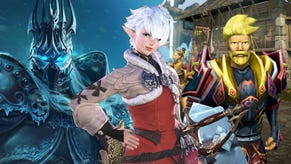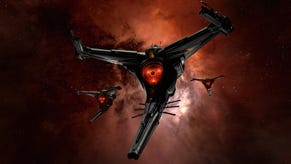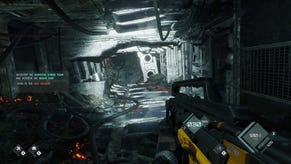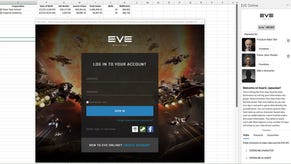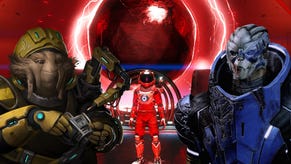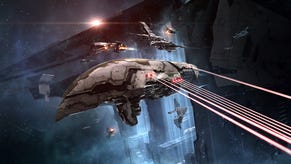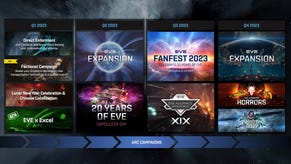The MMOnitor: CCP and Eve
Mum’s gone to Iceland
We caught up with Hilmar Pétursson, CEO, and David Reid, CMO, of CCP to talk about Eve Online, Dust 514, the Tranquility super-computer's consciousness, MMORPG saturation, CCP as a cloud-gaming platform, World of Darkness, and Eve’s future potential as a gestalt societal consciousness.
RPS: Quickly, tell us about the state of play of Eve – how many subscribers have you got?
Pétursson: As you know, last year was quite eventful. It ended on a high note with Crucible coming out and, I think, being universally critically-acclaimed. We won some awards from the MMO sites, but also the fact that Eve grew in 2011, so maintaining its year-on-year growth since 2003.
Reid: That might be unique in the industry, with World of Warcraft taking a dive last year. Eve is the one game that has grown every year since it launched, the only one. We're very proud of that.
RPS: And you've never altered your profit model either.
Pétursson: No, we've maintained our subscription price. We've even raised it a couple of times, because we started so early.
RPS: Every time you've updated the game, you've kept it cutting edge.
Pétursson: Exactly. Some could argue that we've brought it too close to the cutting edge. (laughs)
Reid: Any good, ambitious developer is going to do that sometimes. If you don't push hard and you don't test the frontiers of what's possible, you don't have something that's very exciting. One of the things that's distinct about Eve and CCP, in comparison to standard MMOs like WoW , is that you're getting a lot that's the same from those other companies but Eve year after year continues to add new elements and gameplay. It's not just zones or monsters, there are new play patterns all the time. If you think it's been interesting over the past eight years, wait until Dust connects. It is a whole new universe being built with this.
RPS: The way that Dust connects into the Eve universe, through that space elevator – will PS3 players be able to wander around the inside of stations then?
Pétursson: Not initially. The two experiences are going to be more and more crafted over time. It starts with really meaningful connectivity in the beginning and built on that, like most games in the Eve universe, we’ve taken feedback from customers, what people are excited about, and followed that along.
RPS: How do the Dust players communicate with Eve players?
Pétursson: Already, we're up and running with text chat between the two games. There will also be Evegate, a social networking tool in the universe, and we're looking at allowing them to voice chat. We haven't completed this yet.
RPS: And that shared tech, is that the shared backend you're using for World of Darkness too?
Pétursson: Basically the supercomputer that runs Eve Online has increased quite a lot in size, technically it's running a lot of the Dust aspect as well but then of course the FPS has a massive market share that's distributed around the world. We'll be running it on the Tranquility cluster in London. When it comes to World of Darkness, we'll instance all that know-how and tech into a separate world onto its own separate supercomputer.
RPS: Most MMO guys don't have one supercomputer and you want two? Fine.
Reid: It does speak to what's unique here, right? Whether it's Eve plus World of Darkness and Dust, and how they expand over time... it's easy to forget, against everything else that's out there, with everything being sharded, how shallow those experiences tend to be and how meaningful action in Eve is compared to another game. It takes a supercomputer to run a universe, right? It's not simply sharding a bunch of zones, it's very different.

RPS: I started playing SW:TOR recently, as everyone else you ever talk to will have done; I joined late, so asked my Twitter friends which server should I join? I got 20 different replies. They're all different servers and different levels, so I can't play with my friends. That's broken.
Pétursson: People have often forget how much these different levels segregate the play experience. That's something we've always tried to maintain in Eve, that all different players add to each other's experience. Instead of gating people from each other through levels segregation, if you start playing Eve with a friend who's been a veteran for many years. You immediately add value to each other's experience; that's something which was a huge focus for us in the beginning and was part of the reason why the game has had these long legs. It's a way in which its social networking extends across countries, play styles, languages and cultures.
Reid: and frankly, it's about to extend again, in terms of genres and platforms. If you choose to play Dust as a standard, first-person shooter experience, you'll have the opportunity to do that and just buddy up with friends and take on other players; but the true depth in the tapestry is that you'll be able to do in Eve what you've done for eight years now and have infantry troops on the ground on these planets doing work alongside you to propel the efforts of your corporations forward, by hiring mercenaries or whatever. Groups of crackshot snipers are going to build their gangs in Dust, they're going to sell their services to the highest bidders amongst the Eve starfleet captains. It comes back to what Hilmar was saying, that everyone's actions and contributions matter. You don't have to have been playing this game for five years to make a difference. Certainly if you know the game better and progress further, you'll make a bigger impact, but from the very beginning every ripple you throw into the pond does impact every other individual that's out there.
RPS: It's a model that's very liberal / egalitarian and speaks to specialisation, like Planetside; everyone is valuable, every extra body is an advantage.
Pétursson: That's hard for new players when they start; if you specialise early on, they can actually catch up with the veterns. As you become older, you become more diversified. The gap is not that big, despite it being out for years. We've seen many examples of players rushing to the top of the Eve Online social-political sphere by just being very methodical and specialised about it. That's really where this comes from, new players are able to fashion and impact the world, through specialisation they're able to impact it faster.
RPS: Can you link Eve accounts with Dust accounts? Can you take your Eve character to the battlefield?
Pétursson: Right now, we're focused on play-testing, so the new users can jump into a fantastic AAA shooter. We try to not complicate that too much, so certainly convenience features like you suggest will happen further down the pipeline. We're also rolling out to have feedback from the Eve players about how they want that to go; that's one of the things we'll be talking to the Fanfest this year, through roundtables and panels, and present how the Eve aspect of Dust is going to add value and gameplay for Eve players, and convenience features like you suggest, what the priority is. The Council of Stellar Management, our elected player body, will also guide us and help us align with what players want.
RPS: It's probably changed a lot since you refined the starting user experience, but you used to have a very steep drop-off rate in the number of new people persisting after the free trial. Do you think Dust 514 will partially act as a marketing tool to get people to try Eve?
Pétursson: I certainly wouldn't think about it as a marketing tool. Eve is a very particular type of experience, made for people who want to commit a lot of energy to have a game experience like that. Over the years we've seen a lot of people interested in the Eve universe, the single shard and the political drama, but might not be particularly looking for an experience like the game itself. We see Dust as a way to allow people to participate in this universe by offering them a more intuitive, familiar, speedier, quicker, shorter time-commitment type of experience. It's more about addressing that need, of letting them play the game as they want to, while still adding to the shared experience.
Reid: At some level, it wasn't deliberately designed to be a marketing vehicle for Eve, but if you release a shooter of this quality on the Playstation network with its tens of millions of people who are very familiar with Battlefield and Call of Duty and other great shooters, and you put it out there as a free-to-play game then you will get a huge response, which will generate huge excitement for the Eve universe. So, yes, I fully expect that one of the ancillary benefits of launching of Dust will be tremendous “Marketing-esque”, I'll put that in quotes, exposure. A reminder that, if you took a break from Eve or even if you've been continually playing it, you're going to need to experience what this new facet is. It's such a groundbreaking thing, to combine a FPS with this Sci-Fi MMORPG … it wasn't intended to be a marketing moment, but it absolutely will be.
RPS: Do you think that this cross-platform element of MMOs is the future? Many developers have experimented with applications for phones and tablets, but you're the only one that's gone out to a console and gone “we're going to integrate our universe with this.”
Pétursson: I made the point at the Cloud Gaming Conference that you can almost think of Eve as a cloud, with things linked up to it by multiple approach vectors. I've taken inspiration from the Eve community, which has made an amazing amount of applications, for wiring in mobile devices and additional PC clients, through the little gateway we've provided in the form of the Eve API. One of the high points of adding Dust 514 to the Eve universe is that we've thoroughly extended what used to be the Eve API, which will have its own product name once we've released it, but the technology base really allows for much richer interactivity through various devices, which we at CCP provide, or the grassroots developer community around Eve Online provide. Just to show the desire to access Eve through multiple devices, the Android applications have as many as 500,000 downloads on the Android app store.
Reid: At the Cloud Gaming Conference, we did hear a lot about how gaming equals distribution. And, sure, there is a piece of that. But what really is exciting here is that building content that exploits that technology isn't just using another distribution model. When I first met the guys at CCP, I was at Turner Broadcasting in Atlanta; there's an interesting example of a company that was born in one of these technology shifts, where suddenly cable TV became a big deal. There were companies using cable to distribute their existing content and Turner was one of the first to say “well, there's new kinds of content to make because of cable as a distribution option.” I do not know that there is another company that could claim to be as far along in using cloud computing as way to design new types of content, new types of experience, new windows into this unique universe and not just as a way to distribute and stream games. I mean, sure, that's important hat's going to help change the business to make it better for consumers, but that's a far cry from making content that explicitly exploits and harnesses the power of cloud computing. Not a lot of companies are doing that in the way that CCP are.
RPS: Have you thought of taking technology from firms like Gaikai, so that you can project Eve onto other devices?
Pétursson: Well, no. What they are providing is the ability to stream a PC experience onto any device, a fantastic technology, something we are considering integrating into the value of Eve. It certainly has a lot of potential when it comes to allowing people to try the game out quickly and frankly at the conference I just thought of having the Eve character creator on my iPad, what an amazing thing that would do, and the ease of integration is inspiring. But we try to think of what we're doing as a different breed of cloud gaming, not to get into semantics, but the technology Eve cloud, this persistent single-sharded massive supercomputer which you interact with through multiple devices and experiences. When you look at how far we are along that path, even though we haven't called it cloud-gaming, it's quite inspiring...

RPS: Yeah, also you'd probably need another supercomputer in the same location as the old one, just to handle all the people streaming.
Reid: (laughs) it’s a fine problem to have.
RPS: Obviously, Kurzweil talked about the singularity, that is the exponential advance of computing speeds, and he predicted that in about eight years time supercomputers will be powerful enough to simulate the human brain. Given that, are you ever worried about the future Tranquility becoming conscious and kicking all your players out?
Pétursson: (laughs) What I would become worried about is that if you calculate all the brain power from the up to 60,000 people connected to the Eve cluster at any given moment, who are harnessing their energy into the creation of this world... then 60,000 brains connected into a super-computer could become a super-society so simulating the brain of a single person becomes trivial when taken against that.
RPS: Looking at World of Darkness, you're not talking about it at the moment as it's on the back burner while you focus on Dust. Do you know when you'll be refocussing on it.
Pétursson: We have a kick-ass core team on World of Darkness already and it's inspiring to see how much progress they've made, ever since we went through last year's restructuring. There's no need to worry about World of Darkness. That team is kicking ass and taking names.
Reid: Having rolled over here from Trion and NCsoft myself, the team on World of Darkness is the size of a AAA game team. It's part of me being excited about this transition and coming in here, is seeing that dedication to an absolutely spectacular opportunity, to take the magic that's been inherent in Eve all these years, taking it to an intellectual property with the rich history that WoD does, set in the modern era, tells a story that everyone knows, which men and women both love. All the success of Eve is fabulous, in the hardest-core genre imaginable – imagine that experience and success in a property that _everybody_ can get their brain round and be excited about from day one. The company has not been shy about putting its resources there in parallel with Eve and Dust has been inspiring for me, admittedly as a suit.
RPS: Recently the head of EA Games and the head of Activision have said, in summary, subscriptions are dead and the SWTOR model is archaic. Do you think developers are moving towards the F2P and Turbine models?
Pétursson: I think companies will have less and less control over their business model, it'll be up to the player to decide how they want to pay for their gaming. We introduced Plex into Eve Online, the pilot license extension, which allows Eve players to freely trade a month of subscription within the game, which means a large proportion of the playerbase pays for the game through playing the game, and another portion of the player base is buying currency from other players through this subscription item, so they pay more than their $15. Through this we see that some people want to pay more, some less, giving them the freedom to choose. We've certainly learned that last summer when we didn't give people a choice in the expansion we released, which took away things like ships spinning. The choice of how to play, how to play, what device, where, when...
Reid: It's hard to say that the subscription model is dead; but it's clear that mandatory subscription is a bit of outdated thinking in some respects. I don't imagine that people will be willing to stop playing for subscriptions. I don't know if World of Tanks or League of Legends are MMOS, but they certainly are online games with live services, recurring revenue and continuous development, and they have shown you can build good businesses without the mandatory subscription. Perhaps, the Turbine example, is an indicator that those who rely solely on subscriptions may be hamstringing themselves. Why would you limit yourself?
Pétursson: You can see it with some of the F2P devs out there, that they offer subscriptions where you can subscribe to currency over time. It is the player's decision, how they play, what they want to pay. The company, frankly, shouldn't have an opinion on this as it's in the control of the consumer.
RPS: It's like the Vegas gambling tables and the way they split their tables according to ante; it's about segmenting your market. Think of Bigpoint's F2P game Dark Orbit and its $1000 drones
Reid: Again, it's not just online games. Think about golf. A lot of people are happy to carry their clubs. A lot of people rent a golf cart, have a driver, hire a caddy, buy the super high-end premium clubs for thousands of dollars... they all play golf, they're all having fun, and they're all putting the amount of time and money into their hobby that they choose to at the level of wealth. It's very similar analogy to people at the blackjack table.
Pétursson: Going back to the Plex system we created, we see people playing for free, or paying as much into the game as they want.

RPS: I don't want to talk too much about the controversies you've had, as they've been dealt with extensively elsewhere, but why do you think Eve generates so many more high profile controversies?
Pétursson: I think it's solely from the passion players have for the MMO. Our players hold CCP to a very high standard and every time we don't meet that standard we hear about it. Fortunately, we've listened and reacted and will continue to do that. I would say that the reason you have lots of passionate complaints, is because there's a lot of passion in Eve Online. So when people protested in an “Occupy Wall Street” moment in Eve Online, here are our players not happy, we'll listen and adapt. That's one of the side effects of being on the cutting edge, sometimes you make mistakes.
RPS: Going back to the way you've turned the monthly subscription in the game – have you found it's become devalued or overvalued through market saturation?
Pétursson: There is some fluctuation in the extreme rate between the subscription and the ISK cost, in-game. Some people even speculate on that – people hoard the subscriptions ahead of an expansion because they know there's going to be higher demand. Overall, it's pretty stable, and we run a pretty tight control of the economy, with our chief Economist who monitors this and a team of people who act as our Statistics Bureau, and we try to stay ahead of it if someone's speculating on the market to corner it and drive up prices.
RPS: Has it been affected by the Euro crisis at all?
Reid: (laughs)
Pétursson: No, I don't think we can correlate it to that.
Reid: Although, that's interesting to think about; that the question is even worth contemplating for a moment, speaks to something about this game and community. This is really different from selling platinum in Rift.
Pétursson: Please don't write that Plex caused the Euro crisis!
RPS: Obviously, it's a standard journalist headline-chasing technique to find out if countries are fitting their stereotypes from other countries in a given MMO world, but have you ever had a trouble with the national divides in Eve? I know that the Russian players originally only communicated in Cyrillic, and hence couldn't talk to other players.
Pétursson: I wouldn't call them trouble per se, I've heard many players speak positively about how international an experience Eve is, where everybody is allowed to play together, because usually the way that people set up the shards is that only people from one country play together. It's a rare difference to paly with people from around the world. We have many examples of it, but the Russians are a great example of a people who've really bonded together and created quite a dominant force in the game. There's a lot of context and excitement to it. Overall, it's spoken very positively of by players. It adds spice and colour that people are not used to, it's unique.
RPS: Back to the economy, how do you handle bubbles?
Pétursson: Yes, we see lots of examples of price bubbles actually and that's something that Dr Eyjo (Gudmundsson), our economist, has spoken of at conferences. We see several examples when we release new technology into the game, like new modules or spaceships, and as soon as people see it on the test server, they start speculating on the real server based on the mineral composition. That becomes a classic economic concept of a price bubble and it's interesting how we're constantly proving and disproving economic theory through Eve Online. You should interview him actually, he's much more interesting and key to Eve than David or I.

RPS: Do you that think the MMO market will reach a saturation level? Personally, I think the market for the WoW model might be saturated and possibly declining right now.
Pétursson: It's ultimately about innovation and staying with how consumers would like to consume their entertainment, staying with the cloud gaming concept of having multiple experiences across multiple devices. People have these powerful phones now which people spend a lot of time on. I look at my phone first thing every morning; if I could check my Eve skills and train them and check the market... that is something Eve player wants to do. As long as the industry keeps tune with that, we're far from any saturation point but if we copy the same thing over and over, that strategy will obviously reach a saturation point, a red ocean competitive environment where people are competing for the same thing and same audience. The key thing to the industry is to remain relevant.
Reid: You make a good point; how many fantasy MMORPGs with tanks, healers and DPSes can the consumer base swallow at one time? It's a very fair question. Are we starting to see that, starting to be less exciting to the audience. The notion of, at its core essence, of what an MMO is; of a game that allows for persistence and massive socialisation, yet I still as an individual have a unique identity in that universe... it really feels like this is something that hasn't any cap in sight. I don't want if I'd want to invest in the next great fantasy MMORPG, but I wouldn't want to put my money anywhere else but in this sector.
RPS: Just a personal one, ignoring your own stuff, what game would you want everyone to play and what book would you want everyone to read?
Pétursson: Dark Souls. Certainly that is for me a really interesting game, very different and challenging, which I think perhaps games have lost a little bit, gone more and more mainstream. I'm not really involved with the development hands-on now, but what we wanted to create is a challenging experience and Dark Souls is in that category.
Reid: It's funny, the two books I most recently read were by the same author, Michael Lewis. The Moneyball movie just came out on that, but it was such a fascinating book to read, the idea there, but the notion that this tiny team could be competitive with the New York Yankees and the largest payroll in professional baseball, was fascinating. It came down to boiling the art of baseball down to its scientific statistics. The resistance that the industry had, all the baseball loyalists hated it. Then I just finished Boomerang, basically a historical retrospective on how the ease of cheap credit has permeated all these Western economies; for a five chapter book it was fascinating, chapter 1 Iceland, Chapter 2 Greece, then Ireland, Germany and California. You read it and say “how did we not all see this economic drama coming?”
The game I've not had enough time to play, with this transition, is Skyrim. I love the craftsmanship in the Bethesda universes; I'm very pleased that they're still making single-player AAA games, because I personally love that, and as a businessman in the industry, I'm glad that they're not making a bunch of MMOs that I have to compete with. I'm so glad that Skyrim exists – and I know that I've only scratched the surface.
RPS: What Dark Souls does with the souls of other players, so you can see how they died or call them into help. It feels like a Skyrim game, but because it's so difficult you need that help, so the ghosts really work.
Pétursson: Exactly. Very innovative. What they've done with multiplayer online in a very unusual way, absolutely... It's been a while since I've had time to read a book. I have a book on my table I'm going to read, called the Invisible Gorilla, recommended by one of our designers, about the way the human mind has these bugs to it, which are very important for cognitive thought.
RPS: I hope you take advantage of them. Thanks for your time!


